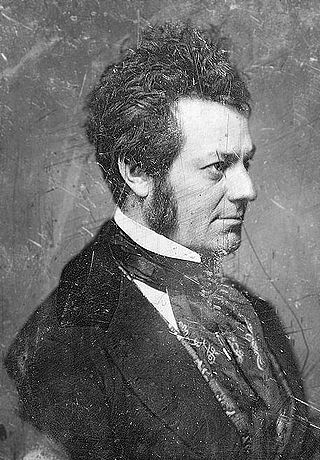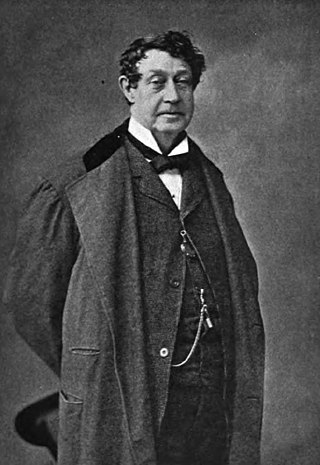Related Research Articles

Abigail Adams was the wife and closest advisor of John Adams, the second president of the United States, and the mother of John Quincy Adams, the sixth president of the United States. She was a founder of the United States, and was both the first second lady and second first lady of the United States, although such titles were not used at the time. She and Barbara Bush are the only two women in American history who were both married to a U.S. president and the mother of a U.S. president.

Charles Kemble was a Welsh actor of a prominent theatre family.

Edwin Forrest was a nineteenth-century American Shakespearean actor. His feud with the British actor William Macready was the cause of the deadly Astor Place Riot of 1849.

Joseph Warren, a Founding Father of the United States, was an American physician who was one of the most important figures in the Patriot movement in Boston during the early days of the American Revolution, eventually serving as President of the revolutionary Massachusetts Provincial Congress. Warren enlisted Paul Revere and William Dawes on April 18, 1775, to leave Boston and spread the alarm that the British garrison in Boston was setting out to raid the town of Concord and arrest rebel leaders John Hancock and Samuel Adams. Warren participated in the Battles of Lexington and Concord the following day, the opening engagements of the American Revolutionary War.

Royall Tyler was an American jurist, teacher and playwright. He was born in Boston, graduated from Harvard University in 1776, and then served in the Massachusetts militia during the American Revolution. He was admitted to the bar in 1780, became a lawyer, and fathered eleven children. In 1801, he was appointed a Justice of the Vermont Supreme Court. He wrote a play, The Contrast, which was produced in 1787 in New York City, shortly after George Washington's inauguration. It is considered the first American comedy. Washington attended the production, which was well-received, and Tyler became a literary celebrity.

James Lanman was an American lawyer and politician from Connecticut who served in the United States Senate from 1819 to 1825. He was a cousin of Presidents John Adams and John Quincy Adams.

Asher Benjamin was an American architect and author whose work transitioned between Federal architecture and the later Greek Revival architecture. His seven handbooks on design deeply influenced the look of cities and towns throughout New England until the Civil War. Builders also copied his plans in the Midwest and in the South.

Jonathan Mason was a Federalist United States Senator and Representative from Massachusetts during the early years of the United States.

William Warren (1812–1888) was an American actor. For decades he performed with the theatre at the old Boston Museum.
Joseph Stevens Jones was an American actor, playwright, theater manager, and surgeon. He wrote at least 150 plays that were mostly produced at theaters in Boston, Massachusetts.
Francis Lathom was a British gothic novelist and playwright.

William Dowton (1764–1851) was a British actor.

The Haymarket Theatre (1796-1803) or Hay-Market Theatre was a theatre in late-18th century Boston, Massachusetts. Organized by Charles Stuart Powell, it occupied a large, wooden building "opposite the Mall on Common Street, near Hatch's Tavern." In addition to dramatic plays, the theatre presented some 62 musical entertainments during its first 5 years. The Haymarket "was seldom used after 1800, and on March 3, 1803, it was offered for sale at auction on the condition that it be removed in 60 days."

The Federal Street Theatre (1793–1852), also known as the Boston Theatre, was located at the corner of Federal and Franklin streets in Boston, Massachusetts, United States. It was "the first building erected purposely for theatrical entertainments in the town of Boston."
John Daly Burk (ca.1776–1808) was an Irish-born dramatist, historian and newspaperman in the United States in the late 18th and early 19th centuries. He died fighting a duel in Virginia in 1808.

John Hodgkinson was a well-known actor in the United States in the late 18th and early 19th century. He was born in England and came to the United States in 1792. William Dunlap and Hodgkinson managed the John Street Theatre together for a few years in the 1790s.
The Italian Father: A Comedy, in Five Acts (1799) is an American comedic play by William Dunlap, though substantially adapted from Part II of The Honest Whore by Thomas Dekker.

Thomas Manders was an actor-manager and low comedian of the early 19th century.
Edward Evans Townsend (1766–1809) was a Welsh stage actor and singer. After making his reputation as a touring actor in Yorkshire, notably at Hull under the management of Tate Wilkinson, he was at the Theatre Royal, Norwich in the early 1790s. He also appeared in Ireland at the Crow Street Theatre and the Theatre Royal, Cork.
References
- 1 2 3 Fifty-years of a Play-goer's Journal, p. 32 (1860)
- ↑ Seilhamer, George O. History of the American Theatre: New foundations, pp. 357-59 (1891)
- ↑ Highfill, Philip H, Jr. et al. Biographical Dictionary of Actors, Actresses, Musicians, Dancers, Vol. 1, p. 306 (1973)
- 1 2 3 Letter from Giles Leonard Barrett to U.S. President John Adams (6 October 1798)
- ↑ Adams, William Davenport. A dictionary of the drama, Vol. 1, p. 114 (1904)
- 1 2 Clapp, William Warland. A Record of the Boston Stage, pp. 37-39 etc.(1853)
- ↑ Ball, William T. W. The Old Federal Street Theatre, in The Boston Society Publications, Volume 8 (1911)
- ↑ Wilmer, S.E. Theatre, Society and the Nation: Staging American Identities, p. 53 (2004)
- ↑ Dunlap, William. A History of the American Theatre, p. 354 (1832)